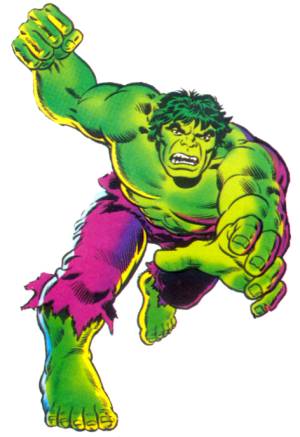| mind games |
The Incredible Hulk fails to move Quentin Heath
The release of The Hulk, for the 48K Spectrum, marks the culmination of several months of collaborative effort between Marvel Comics and Scott Adam's UK company Adventure International.
The graphics adventure, which has a screen format almost identical to that of The Hobbit, features Marvel superheroes and villains such as The Hulk, Dr Strange and The Chief Examiner. It is Marvel's first venture into the world of microcomputer software and it is doubtful whether it would have made an entry if publisher Stan Lee and Scott Adams had not formed a team dedicated to producing a series of games based on comic characters.
Both men been innovators in their heydays. Lee almost single-handedly created the comic market in Britain and created many of the Marvel heroes. Scott Adams is the man who invented the microcomputer-based adventure game. He was behind the first commercial adventure to be launched, Adventureland, and has most of the responsibility for bringing The Hulk to the small computer screen. The game uses the classic Adams textual style, which he took from the larger main-frame adventures, combined with graphics which are drawn at a speed which rivals The Hobbit.

The graphics routines may be innovative but the text translator routines which decode the player's instructions to the computer are simplistic and crude. They, allow only the use of a verb and noun structure which means only one instruction at a time can be typed into the machine and all commands must conform to the same format.
The program will only understand words which are relevant to a particular location and will ignore all others, sending an error message to the player with apologies for its ignorance. That puts user-friendliness right out of the window and makes the player feel as though the game was written in the stone age of computing.
If Adams had been limited for memory space within the program he should have put to one side the detailed pictures which emulate The Hobbit and instead worked on the translator so that it could handle multiple phrases within sentences coupled by conjunctions. Such techniques might have been innovative six or seven years ago, when Adams first started writing games, but in the British market today, they are old hat.
The story involves Dr David Banner and his alter-ego The Hulk in a quest to find the Bio-Gem, an orb of energy with fantastic powers. While trying to accomplish his quest Banner must collect several ordinary gems. Finding and placing the gems is the main method of scoring in The Hulk and you are not given a logical reason for so doing. The same is true of the character motivation within the game. Unlike many of the classic adventures, created by such companies as Level Nine Computing and Digital Fantasia, the characters within The Hulk are not given any motivation apart from an allegiance with either good or evil.
The total lack of character realisation produces cardboard cutouts which you will not find even in the comic books. In those publications the heroes try to lead ordinary lives, such as Peter Parker who as well as being Spiderman also leads a more mundane life is a newspaper photographer. In the comics characters worry about money, the level of crime in society and even where their next meal is coming from.
The Hulk adventure, however, takes none of those factors into the storyline and so the player tends not to feel any attachment to hero or villain. The Hulk would have been an excellent opportunity for Stan Lee's brand of super-human drama.
While the characters are uninteresting the plot is too inventive. The authors have taken great leaps and expected the player to follow. For instance, The Hulk creature is an integral part of the adventure and helps Banner to get out of most of the tight spots. The player, however, will either have to be clairvoyant or pay attention to all the examples in the instruction booklet to find the one way in which Banner can turn into this alter-ego.
If you are a gamer who does not want to look at the help sheets supplied with the game to solve the adventure then you are likely to be disappointed with The Hulk, unless you have a power of deduction which borders on ESP.
Most adventure writers leave 'plants', or objects which aid understanding, at every location. Adams does not bother with that and you move suddenly from open fields to an underground enclosure without entering a dome or going through a tunnel. Any map-making techniques, which have been started when the player is transported, will become useless and a new strategy will have to be formed.
Adams seems to be in a time warp. He is still writing for the 1970s and does not seem to be aware of the latest advances in adventure writing techniques.
The Hulk will sell but not because of its technical excellence. Marvel has put so much commercial hype behind the product that anyone enticed by superheroes will buy it. That is a pity as there is too much hype in the market already and the new Marvel adventures only add to it.
HINTS AND TIPSBecoming the Hulk can be a biting problem. The Chief Examiner will tell you where you are. The power of the egg can destroy all but the Hulk. Take Strange at his word. |